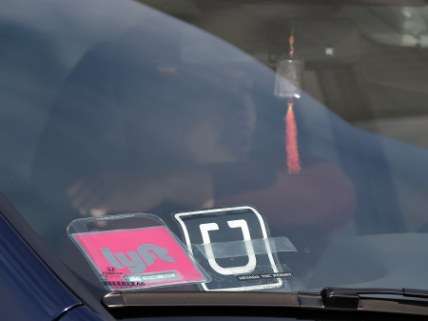Looking for a Left/Libertarian Alliance Against Trump? Maybe Rethink Reflexive '#DeleteUber' Reactions
Constantly looking for people to punish doesn't square with a commitment to liberty.


Everything went to hell over the weekend for the immigrants and refugees who had been legally approved to live and travel in the United States but were then caught up in President Donald Trump's terrible executive order banning them from returning back into the country.
I watched through social media the outraged reactions across the political spectrum from friends and analysts alike. The reasons for the opposition varied. Some (especially on the left) thought the order remarkably cruel. Others acknowledged the president's authority to generally regulate immigration rules but recognized this executive order as being poorly drafted and illegal. There was a reason that when I blogged about the stay on Trump's order I pointed to the argument by the American Civil Liberties Union that the order violated due process.
For much of Saturday it felt very much like a coming together of anybody who valued human liberty and the rule of law across the political spectrum. I found it so much more an important and positive development than the women's march because it was about something very concrete and fundamental to American values. I've gotten so used to the reflexive, condescending "This is not who we are" derision that President Barack Obama's administration used to try to shut down criticism. It was different to see people across the political spectrum in significant agreement (though, yes, there were some exceptions), even if not for the same reasons.
Then "#DeleteUber" happened, and I threw up my hands and yelled, "Goddammit!"
In New York City, taxi drivers organized a work stoppage to stop ferrying travelers to John F. Kennedy Airport for an hour in solidarity with those who were being detained there. I will admit that I was at first utterly mystified as to how refusing to transport people in New York for a while would help resolve any of this at all, but after reading their Facebook statement, I realized that it wasn't really a "strike" so much as taking an hour so that they could participate in the protests as well.
Uber continued ferrying travelers and—interestingly—announced that it was ending its price surge. While Uber catches a lot of flak for having price surges at peak hours from people who don't understand basic supply-and-demand economics, they caught flak this time for continuing service. They were perceived as trying to "break" this strike.
In addition, Uber CEO Travis Kalanick has agreed to join Trump's economic advisory team (along with the likes of Elon Musk and Disney CEO Bob Iger). Despite a Facebook post from Kalanick declaring that Uber was going to do what it could to assist drivers who would be negatively affected by Trump's executive order, this apparently wasn't enough for some. A social media movement sprang up to encourage people to delete the Uber app from their phones and go with a rival like Lyft instead.
Under normal circumstances and with other companies, this would merit a shrug from libertarians (it might still). Uber has a right to operate, but it doesn't have a right to customers. People have the right to choose with whom to do business and to use public pressure to influence company decisions. In this case, I don't think either side has behaved unethically or illegally.
So why the frustration? First of all, we can't look at this protest in a vacuum. Uber is a company that is frequently targeted by protectionist taxi cartels and unions (and leftist supporters), and they're willing to use their power and influence to use government force to stop Uber's operations as much as they can. There is a bit of an obvious political trap going on here, and Uber kind of fell into it.
Second, the response is symptomatic of a deeply entrenched desire to use a communal form of punishment against those who are perceived as straying from established ideological positions. It's practically a reflexive response at this point to find somebody to attack. Why do headlines like "Can Taylor Swift call herself a feminist after skipping Women's March?" even exist (and there are other versions of this kind of story)? These kind of responses do not reflect a desire or a willingness to "live and let live." Even in an environment where the left is struggling to maintain influence, they're calling out allies for not showing up for marches or for employing poor people, minorities, and immigrants in a way that doesn't match the progressive playbook.
This reflexive desire to punish leaves me with a deep concern that even in the face of Trump, there is no stomach on the left to engage in introspection over its own authoritarian tendencies. And I'm going to remember pushes like "#DeleteUber" every time I see a call for libertarians to partner with liberals or the left to fight back Trump's worst policies. It's not because I don't agree—it's because I don't see a commitment to advancing freedom in response to Trump. I see a commitment to regaining control and authority. Thus, I don't see any "partnership" forming so much as two deeply ideologically different groups pushing for similar outcomes for different reasons. I don't want more power, except over my own life. I want more freedom.
When I (and others at Reason) bring up Obama and the left's role in expanding the power of the executive branch, this isn't merely some sort of "whataboutism" excuse for whatever awful thing Trump is doing or will be doing in the future. It is absolutely, utterly necessary to understand where this power came from in order to change it, and it's therefore utterly necessary for liberals and leftists or progressives to rethink their relationship with government authority.
Unhappy with Kalanick's and Musk's relationship with Trump? They're just doing what they've been doing all along regardless of the political party of the person in charge. Musk, at least, would have his hands all over a Hillary Clinton administration as well. Her proposed tech policy was full of cronyist opportunities for the "right" folks in the right industries, an extension of what was offered by the Obama administration. The expansion of the power of the government and its regulatory system has put businesses in a situation where not only is it extremely profitable to get cozy with the government; it's sometimes necessary to survive.
If liberals are not willing to consider that government authority itself is the problem and are insistent that the problem is Trump's particular brand of ego and narcissism, what does this partnership with libertarians even look like? If the only goal is regime change, what exactly is the role libertarians are meant to play in this push other than supplying additional numbers?
Allow me to pivot to something that seems completely unrelated, but I assure is not: The occasionally dismissive response to the critique of "political correctness culture" at colleges. In the wake of Trump's election, I've seen frustrated responses targeting libertarian outlets (including Reason) for continuing to hit at this subject even while Trump promises a horror show of civil liberties violations.
Besides this argument presenting a false choice (Reason certainly hasn't abandoned reporting on a whole host of other topics in favor of complaining about college kids today), it ignores the very real long-term potential authoritarian consequences of this college campus speech- and sex-policing. Reason has hit back frequently on the actual impact on people's lives—potentially costing students' their educations and threatening their livelihoods—when college administrators fail to respect the First and Fifth Amendment rights of their students.
But that's just a look at the consequences of what's happening right now. Less discussed is how these selfsame students—who are being taught to ignore concepts of free speech and due process if it results in outcomes they don't like—will eventually inherit the systems of government in a decade or so. What happens when a college student who internalizes that due process shouldn't apply to people accused of rape becomes a juror—or a judge? What happens when a student who doesn't believe "hate speech" counts as free speech becomes a member of Congress?
This is precisely why I mentioned up above that Trump's executive order against refugees and immigrants violated due process. Trump isn't just a "consequence" of political correctness activism—he is the cracked mirror reflection of it. Trump has no respect for free speech or due process or really any civil liberties at all.
So what I would recommend to anybody calling for an alliance between libertarians and the left (regardless of whichever side is making the call) is not look at Trump as some particularly remarkably bad outlier and anomaly (though he is certainly giving every sign he's going to be remarkably bad), but as an expression of the constantly present dangers of authority that cares only about the "right" outcomes and nothing about legal foundations and limits to power based on defenses of human liberty and civil rights.
There will obviously be places of intersection between libertarians and the left—places where we've been on the same team even before Trump, like criminal justice reform, immigration, and the scaling back of the drug war. But unless the left is willing to reconsider its relationship with authority and its desire to want to use power to punish its opponents (which occasionally includes libertarians, lest we forget), what are libertarians supposed to see as the endgame of all this? Long ago, I asked conservatives what happened to the power they were giving President George W. Bush after he left office. Later I asked the same to liberals about Obama. Now here we are, and now we know. How much government authority are you willing to eliminate to stop Trump? Think about it and get back to me.


Show Comments (215)